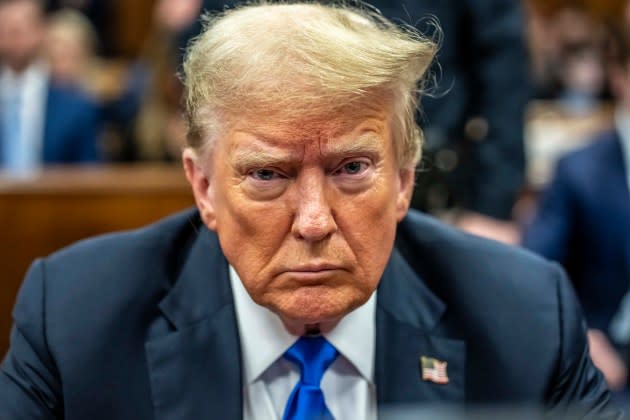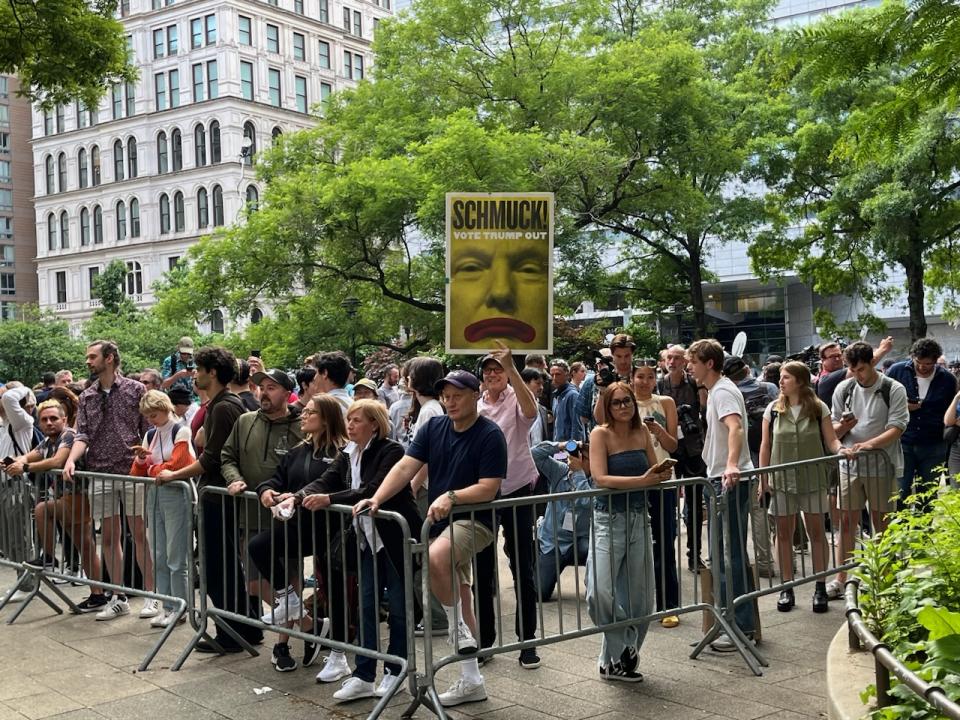Donald Trump Found Guilty Of All Felony Charges In Hush Money Trial

A jury in New York City today found former president Donald Trump guilty of all 34 counts of falsifying business records as part of a conspiracy to keep a potential sex scandal from derailing his first presidential campaign.
He is scheduled to be sentenced on July 11, just days before the start of the Republican National Convention.
More from Deadline
Hollywood Reacts To Donald Trump Verdicts: “34 Is Now My Favorite Number”
Robert De Niro Responds To Donald Trump Verdict: "This Never Should Have Gotten To This Stage"
The verdict, in the only one of four criminal cases against Trump to go to trial to date, could have far-reaching effects on his bid to recapture the White House in November. The first impact is likely to be a tidal wave of reaction across broadcast and social media to the outcome of a trial with no precedent in U.S. history.
As the verdicts were read, Trump sat motionless between his attorneys, Todd Blanche and Emil Bove. Blanche asked for all of the jurors to be polled, and they all affirmed their guilty verdicts. The judge, Juan Merchan, then rejected Blanche’s motion to set aside the verdict.
RELATED: Manhattan D.A. Alvin Bragg Says Donald Trump Conviction Was Reached “Without Fear Or Favor”
As he left, Trump told reporters that the verdicts were a “disgrace,” a common refrain during the trial. “This was a rigged disgraceful trial,” he said. He also continued to blame the trial as the work of Joe Biden, but the charges were brought in New York state court by Manhattan D.A. Alvin Bragg, not the Justice Department.
Trump faces up to four years in prison for each count but it’s unclear whether Merchan will call for time behind bars at sentencing.
RELATED: Watch The Trump Verdicts As They Are Announced Live On Fox News, CNN & MSNBC
The late-afternoon jury verdict galvanized the media, with cable news networks, fixated on the Manhattan courthouse for much of the day, joined by broadcast networks with special reports. Anchors quickly noted the historic importance of the moment, as Trump is now the first former president to be a convicted felon.
What’s unclear is what the ultimate impact of the verdict will be politically. Cable news punditry and analysis, which had been offering non-stop commentary on the likely outcome of the case, turned to whether the conviction would have a substantial sway on the electorate.
House Speaker Mike Johnson, a staunch defender of the former president, called the verdict a “shameful day in American history. Democrats cheered as they convicted the leader of the opposing party on ridiculous charges, predicated on the testimony of a disbarred, convicted felon. This was a purely political exercise, not a legal one.” The Trump campaign posted a fund-raising pitch just minutes after the verdict.
RELATED: See Each Of The 34 Felony Charges In Donald Trump Hush-Money Trial
Ian Sams, a White House spokesman, said, “We respect the rule of law, and have no additional comment.”
Biden’s presidential campaign spokesman, Michael Tyler, said in a statement that “Donald Trump has always mistakenly believed he would never face the consequences for breaking the law for his own personal gain. But today’s verdict does not change the fact that the American people face a simple reality. There is still only one way to keep Donald Trump out of the Oval Office: at the ballot box. Convicted felon or not, Trump will be the Republican nominee for president.”
Convicted felons can still run for office, and the Constitution also does not bar a convicted felon from serving as disqualifying a person from the presidency.
RELATED: 2024 Presidential Election Debate Schedule: Dates, Times, Who’ll Be There And Who Won’t
Outside the Manhattan courthouse after the verdict, the scene was of a heavy police presence, with a helicopter buzzing overhead. Across the street, a park set aside for protests was more filled with people since the trial started. There were some heated exchanges between pro- and anti- Trump demonstrators, but few raised voices. If anything, the surprise was how relatively quiet it was, given the circus-like atmosphere outside at other moments of the case.

Jurors in the six-week trial saw a procession of witnesses from several walks of Trump’s life. They included a former tabloid publisher, David Pecker, who helped Trump keep embarrassing stories from coming out, and a former trusted political adviser, Hope Hicks, who wept on the stand remembering a conversation with her White House boss. A group of Trump Organization employees, testifying under subpoena, were called to help prosecutors trace a money trail that was critical to their case.
The most closely watched — and harshly cross-examined — witnesses were Stormy Daniels, the porn star who accepted $130,000 to stay quiet about her claim of a one-night stand with Trump; and Michael Cohen, the roving Trump lawyer and fixer who paid Daniels, and testified that Trump repaid him with faked billing for legal work he never performed.
The trial turned over a rock on a seamy information trade complete with payouts and non-disclosure agreements that provided a template for Pecker paying former Playboy model Karen McDougal and Cohen paying Daniels for their silence about alleged sexual encounters with Trump.
Jurors heard that Pecker and his deputy, The National Enquirer editor Dylan Howard, paid five and six figures to tipsters with scandalous claims about celebrities such as Arnold Schwarzenegger and Charlie Sheen. They didn’t always publish dirt, Pecker testified; sometimes they held it over a celebrity to persuade them to sit for interviews or cover shoots in Pecker’s gossip and lifestyle publications.
With this network of gossip exchange at his disposal, Pecker promised to be his longtime friend’s “eyes and ears” for any salacious claims about Trump that might surface during his presidential campaign.
Prosecutors said that Trump’s victory in 2016 was partly a product of the criminal conspiracy they alleged in their indictment, as Trump and Cohen resorted to a proven “catch and kill” hush-money strategy to buy Daniels’ silence in the campaign’s last days.
With the GOP nominee reeling from the October surprise of the infamous Access Hollywood tape, and Daniels threatening to step forward, Cohen sent $130,000 to Daniels’ lawyer, Davidson, on October 27, 2016 using a fake real estate consulting shell company.
The $420,000 in total that Cohen received from then-President Trump during 2017 was his reimbursement for the deal with Daniels, prosecutors said. It was not, prosecutors argued, monthly taxable income for ongoing legal work under a retainer agreement, as it was made out to be in 34 invoices, ledger entries and checks with attached pay stubs.
Trump signed checks to Cohen that traveled in express mail envelopes between Trump Tower in New York and he White House, with stopovers at the Washington, D.C. home of a Trump bodyguard, Keith Schiller, who followed his boss from the private sector to the country’s highest office. Jurors saw scans of the checks bearing Trump’s spiky signature.
The 34-count indictment rested on a law against falsifying business records and an obscure statute prohibiting election influence by “unlawful means.” Legal observers called the prosecution’s strategy novel because it required jurors to climb a kind of statutory ladder with one of the rungs being a rarely cited, and possibly never before prosecuted, state law against election conspiracies.
For each felony count, jurors would have to find beyond a reasonable doubt that Trump, either on his own or in league with Cohen and others, falsified the paperwork for Cohen’s repayment and did so with an “intent to defraud” that included promoting his candidacy through the aforementioned unlawful means.
Merchan, in his instructions to the jury, gave them three options to pick and choose from for checking off the unlawful means box: Cohen’s $130,000 payment to Daniels as a violation of the contribution caps for individuals ($2,700) and corporations ($0) in federal elections that were in force in 2016; other falsified business records including for a phony shell company set up by Cohen to wire hush money to Davidson for Daniels; and deliberately misleading information provided in tax returns connected to the money that circulated between Cohen, Daniels and Trump.
Jurors had to “conclude unanimously” that Trump’s and Cohen’s actions met the unlawful means test, but wouldn’t have to be unanimous as to which unlawful means; they could pick and choose. If they cleared all these hurdles they could find him guilty.
The trial was conducted under a heavy veil of security, with metal barricade fencing ringing the Manhattan Criminal Court building, and uniformed court officers joined by members of the New York Police Department and the Secret Service to keep watch on people and activity at a courthouse that was filled with journalists covering the trial while still going about its regular daily business.
Protests were confined to a public park across the street carved up with barricades into separate pro- and anti-Trump camps. Trump blamed the paltry daily showing from supporters on the security, complaining in his regular addresses to pool reporters in the courthouse hallway that the area outside looked like “Fort Knox.”
Best of Deadline
2024 Premiere Dates For New & Returning Series On Broadcast, Cable & Streaming
'Knives Out 3': Everything We Know About The Second Rian Johnson Sequel
Hollywood & Media Deaths In 2024: Photo Gallery & Obituaries
Sign up for Deadline's Newsletter. For the latest news, follow us on Facebook, Twitter, and Instagram.
